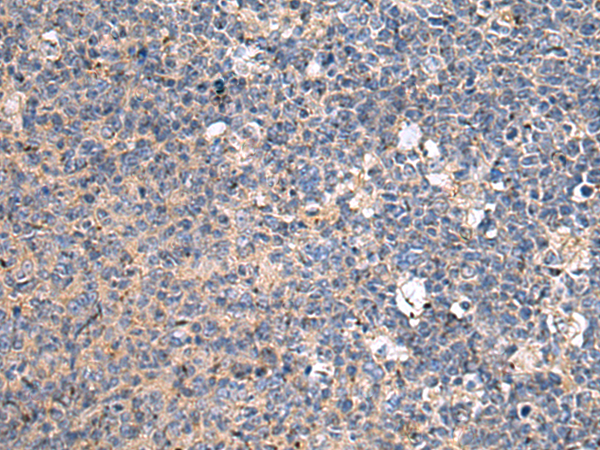
| WB | 咨询技术 | Human,Mouse,Rat |
| IF | 咨询技术 | Human,Mouse,Rat |
| IHC | 1/50-1/100 | Human,Mouse,Rat |
| ICC | 技术咨询 | Human,Mouse,Rat |
| FCM | 咨询技术 | Human,Mouse,Rat |
| Elisa | 1/5000-1/10000 | Human,Mouse,Rat |
| Aliases | ARP1; Arp1A; CTRN1 |
| Host/Isotype | Rabbit IgG |
| Antibody Type | Primary antibody |
| Storage | Store at 4°C short term. Aliquot and store at -20°C long term. Avoid freeze/thaw cycles. |
| Species Reactivity | Human, Mouse, Rat |
| Immunogen | Fusion protein of human ACTR1A |
| Formulation | Purified antibody in PBS with 0.05% sodium azide and 50% glycerol. |
+ +
以下是关于ACTR1A抗体的3篇参考文献的简要信息:
1. **文献名称**:*ACTR1A is a component of the dynactin complex required for dynein-mediated intracellular transport*
**作者**:Schroer, T. A., et al.
**摘要**:该研究阐明了ACTR1A(ARP1)作为动力蛋白激活复合体(dynactin)的核心组分,通过免疫共沉淀和抗体标记证实其与细胞质动力蛋白的相互作用,揭示了其在细胞内运输中的关键作用。
2. **文献名称**:*Characterization of the role of ACTR1A in mitotic spindle organization*
**作者**:Husain, K., et al.
**摘要**:利用ACTR1A特异性抗体进行免疫荧光实验,研究发现ACTR1A通过调控微管稳定性参与有丝分裂纺锤体组装,缺失ACTR1A会导致染色体分离异常。
3. **文献名称**:*ACTR1A expression correlates with cancer cell motility and invasion*
**作者**:Li, X., et al.
**摘要**:通过Western blot和免疫组化分析,该文献报道ACTR1A在多种癌细胞系中高表达,其抗体检测显示其表达水平与细胞迁移和侵袭能力正相关,提示其作为癌症治疗靶点的潜力。
以上文献均使用ACTR1A抗体进行功能或机制研究,涵盖细胞运输、分裂调控及疾病关联等领域。
The ACTR1A (ARP1 Actin-Related Protein 1A) antibody is a tool used to study the ACTR1A protein, a member of the actin-related protein (ARP) family. ACTR1A plays a critical role in cellular processes such as vesicle trafficking, organelle positioning, and cytoskeletal organization. It is a key component of the dynactin complex, which interacts with dynein motors to facilitate microtubule-based intracellular transport. ACTR1A shares structural homology with actin but lacks filament-forming ability, instead stabilizing dynactin’s structure and enhancing dynein-mediated cargo movement.
ACTR1A antibodies are widely employed in techniques like Western blotting, immunofluorescence, and immunohistochemistry to detect protein expression, localization, and dynamics in cells or tissues. These antibodies help researchers investigate ACTR1A’s involvement in mitosis, neuronal transport, and cell migration. Dysregulation of ACTR1A has been linked to neurodegenerative diseases, cancer metastasis, and developmental disorders, making its study clinically relevant.
Most ACTR1A antibodies are raised against specific epitopes, such as the N- or C-terminal regions, and are available in monoclonal or polyclonal forms. Validation includes testing for cross-reactivity with other ARP family members. Proper controls, like siRNA knockdowns, ensure specificity. Commercial antibodies often cite applications in human, mouse, or rat models, aiding comparative studies across species. Overall, ACTR1A antibodies are vital for dissecting cytoskeletal mechanisms and their pathological implications.
×